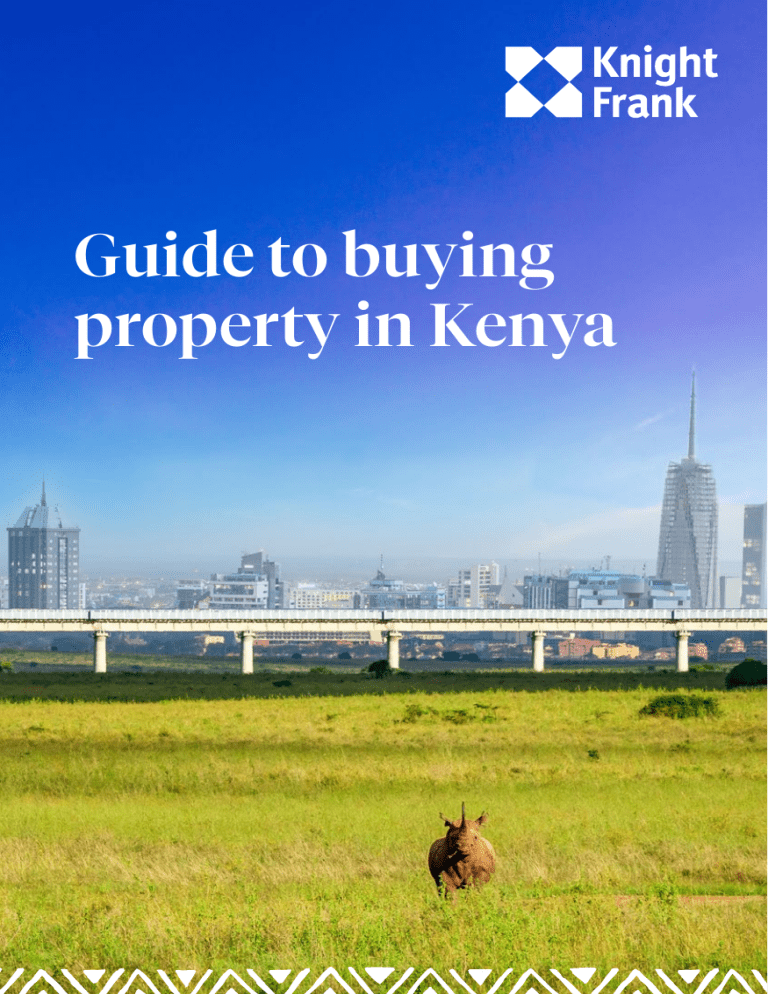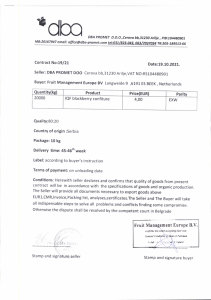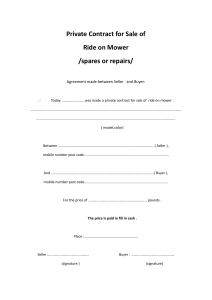
Guide to buying property in Kenya The Purchase of Real Estate in Kenya Buying property in Kenya is relatively straight forward. However, contracting the services of a reputable agent and advocate is highly recommended to receive appropriate legal advice and representation throughout the sales process. It is also advised that the buyer avoids making any payments directly to the vendor/seller or their agent, but instead channel monies through advocates so that the requisite precautions can be taken. Foreigners’ purchasing regulations Just like Kenyan citizens, foreigners are permitted to buy land, commercial and residential property located within a town or municipality without any restrictions whatsoever, provided they comply with the laid down procedures. The only restrictions are on owning agricultural land and freehold titles. Article 65 of the Kenyan Constitution limits foreigners to holding leasehold titles for a maximum of 99 years but permits future renewals on condition that the subject property held under that title is economically active and it is not required for public use/purposes. This therefore means that if a foreigner purchases property held under a freehold title, it will revert to a leasehold tenure. The restriction also applies to companies that are not wholly owned by citizens or property held in trust whose beneficiary is not a citizen. The Land Control Act Cap 302 of the Laws of Kenya regulates transactions on agricultural land. Foreigners or privately owned companies whose shareholders are not all Kenyan citizens are not permitted to buy/own agricultural land, as stipulated in Section 9 (c). However, exemptions by the President, based on the provisions of Section 24 may be permissible. Therefore, foreign investors wishing to acquire agricultural land may apply for such exemptions, which are done through a publication in the Kenya Gazette. Purchasing Process Although, parties can mutually agree on a sales closure period that suits them, the standard transaction duration for the sale of property in Kenya is generally 90 days, effective from the date of signing the sale agreement through to completion. The process begins with the buyer identifying a property for purchase, advisably through enlisting the services of a reputable real estate agency/ firm. The buyer is advised to visit the property or site to ensure that it meets their desired requirements. Upon confirming interest in the property, the buyer should make a formal expression of interest i.e., provide an offer, subject to contract, that details their offer price, terms of payment and advocate details. Buyers may also have a survey conducted prior to exchange of contracts if they wish, however it should be noted that this will increase transaction costs. If the offer is accepted by the seller, then the agent is expected to prepare a Letter of Offer (LOO) confirming the salient details of the agreed transaction. This is then signed and acts to formally instruct the legal teams of both parties. Letters of Offer: Some Letters of Offer demand that buyers pay a requisite down payment/ deposit of at least 10% of the purchase price immediately on signing it. Other Letters of Offer simply seek to establish the buyer’s commitment to the deal by way of a signed agreement regarding the basic terms of sale. In this case, the deposit is held by the seller’s advocates as stakeholders pending completion of the transaction in accordance with the terms of the sale agreement. Alternatively, the buyer and seller can mutually agree to open a joint escrow account mandating both their advocates to oversee the purchase funds until completion of the sale. Typically, the turnaround period for signing the Letter of Offer is between 7 to 14 days from the date of issue. However, it is important to note that in Kenya, Letters of Offer are subject to contract and not treated as a legally binding contract, but rather a pact that in principle both parties have accepted to transact at an agreed price. The transaction only becomes legally binding after signing the sale agreement. Thus, after signing the Letter of Offer, either party can withdraw from the deal without suffering a financial loss or being subjected to litigation. After the Letter of Offer is signed, the buyer and seller proceed to instruct their respective advocates to engage on the transaction. Due diligence subject to contract Buyers should verify that due diligence has been conducted to authenticate ownership and other material aspects and documentation pertaining to the property. After receiving the abstract of title of a property from the seller, the buyer should ensure that the title is investigated. This is done through conducting searches at the Land Registry, Company Registry, Probate Registry, Survey Department, a physical inspection of the property as well as a search of court records. The caveat emptor rule (‘‘buyer beware’’), remains a cornerstone of property acquisition. It is prudent to find out as much as possible about the property before executing a binding agreement. In addition to conducting an official search on the title at the Lands offices, the buyer should also engage a licensed surveyor to confirm that the land size and boundaries indicated on the deed plan match what is on the ground. All registered land is subject to certain overriding interests which may subsist without their being noted on the register. This may include, but are not limited to, spousal rights over matrimonial property, trusts, rights of way, rights of water, etc. Due diligence also needs to be done in this regard. The documents ordinarily required from the buyer as part of their due diligence, would include copies of the seller’s Personal Identification Documents (ID/Passport copies) and PIN Certificate, amongst others. In the event of a Company purchase, the Certificate of Incorporation and PIN Certificate would form part of the Identification documents. If the due diligence is successful, the buyer can then instruct their advocate to proceed to contract stage. Upon receipt of the contract from the seller’s advocates, buyers are required to sign the Letter of Offer as a sign of assurance to transact. The procedure may vary slightly depending on whether one is buying a property that is ready for occupation, land or an off-plan property. When buying land or a property that is ready for occupation, once the deposit is paid, the transaction is completed within a defined closure period, normally 90 days, from date of signing the sale agreement. When buying a property off-plan, after paying the requisite deposit, the buyer normally pays a percentage of the purchase price in equal instalments until the project is completed. Essentially, the main difference is the payment terms. Ardhisasa With the advent of the National Land Information Management System, better known as Ardhisasa, a lot has changed with regard to property transactions. Ardhisasa is an online platform that allows people to interact with land information that is held and processed by the Government of Kenya. The system was introduced to help improve land management through providing up-to-date information on land resources. The services that Ardhisasa offers include payment of stamp duty, valuation requests and registration of land documents and searches, among others. Another essential service the platform offers is the cadastre which georeferences land by providing co-ordinates that locate where a land parcel is. The move is in line with the process of conversion of all land parcels from the regime of the repealed land statutes to the purview of the Land Registration Act, 2012. To interact with the platform, a landowner must open an individual/ corporate account on the platform. This creates a challenge especially for foreigners since to complete registration one must input their national identification number. However, foreign buyers are advised to contact Ardhisasa customer care agents via helplines or the chatbot on the website. In order to create a ticket to engage with an official who will assist in creating an account, the buyers’ name, Alien ID, email address and phone number will be required. The platform currently covers land registered in the Nairobi Registry, with a projection that with time it will cover all land in Kenya. At present, the platform does not cover property that does not have geospatial data such as sectional properties. Furthermore, 90 days after a parcel is gazetted to be closed, no manual transactions can be carried out on the affected land parcels, most of which are located within Nairobi County. Ardhisasa has had a few hitches since its inception which include the long period it takes to complete the validation of titles. It is envisaged that the system will eventually surmount these challenges as it seeks to ensure efficiency in the management of records and transparency of services in the land sector. Completion On the completion date, buyers are required to pay the full balance of the purchase price in exchange for complete documents from the seller. Similarly, buyers opting for mortgage funding on the balance of purchase price, must provide an irrevocable undertaking/bank guarantee issued by their bank’s advocate and further supported by an undertaking from their own advocate to the seller’s advocate. Once the buyer’s advocates are in receipt of the completion documents, they plan for the property to be assessed for stamp duty by a government valuer and subsequent stamping of transfer documents. Thereafter, they proceed to lodge the property for registration in favour of the buyer. After the registration process, the seller’s advocate is legally permitted to release the full proceeds of the sale to the seller. Consequently, the buyer is officially handed over possession of the property and becomes the new legal owner. The certificate of title issued by the Registrar upon registration, or to a purchaser of land upon a transfer by the seller is taken by all courts as prima facie (at first appearance), evidence that the person named as the proprietor of the land is the absolute and indefeasible owner. It is also possible to purchase land in Kenya without being in the country. One can assign a lawyer to go through the whole process on the buyer’s behalf through a power of attorney. Consents All necessary consents are required to complete any given transaction. In the absence of obtaining the necessary consents, the conveyance (be it a lease, mortgage, transfer, etc.) will not be registered. Some of the more common consents required include the Land Control Board Consent, County Land Management Board Consent, and Spousal Consents. Property Transactional Costs Buyers will incur certain transactional costs when buying either residential or commercial property in Kenya. Buying Residential Property Land Rates & Land Rent clearance certificates Depending on which tenure a parcel has been registered, the land rents and rates of a given property will have to be paid before a clearance certificate is issued. It is the responsibility of the registered proprietor of a parcel of land to ensure that Land Rates and Land Rents are paid, and to obtain the necessary certificates, unless agreed otherwise. Stamp Duty This levy is centred on the property value and the State relies on the amount returned by the Government Valuer or the purchase price agreed upon; whichever is higher: • 4% for land/property within a municipality • 2% for agricultural land or property outside a municipality • 1% if a property is registered as a company and transfer is by way of shares rather than title Legal fees Each party pays for their own legal fees based on a percentage of the purchase price on a scale stipulated in the Advocates Remuneration Amendment Order, 2014. The only exception which appears to be a common practice, is where buyers are required to pay legal fees for both parties when buying an apartment from developers. The argument for this is based on the fact that the seller’s lawyer is the one who does the registration for all the leases on behalf of the buyer. Agency fees The agent is paid by the party who instructs them either by the seller who instructs the agent to market the property or the buyer who instructs the agent for a property acquisition. The fee is on a scale capped at a maximum of 3% of the property’s value. Registration and disbursement fees Buyers are generally responsible for the cost of registration of titles in their name(s) together with other disbursement costs as may be advised by the seller’s advocate. This document has been compiled as a guide for potential purchasers of property in Kenya. It does not seek to provide or replace the legal advice that the purchaser should obtain, nor is it intended to have any contractual effect. FEES It’s not an estate agent you need, it’s a partner in property KNIGHT FRANK KENYA Lion Place, Ground Floor Waiyaki Way, Westlands P.O. Box 39773-00623 Nairobi, Kenya. +254 (0)20 423 9000 Your partners in property knightfrank.co.ke Knight Frank Research provides strategic advice, consultancy services and forecasting to a wide range of clients worldwide including developers, investors, funding organisations, corporate institutions and the public sector. All our clients recognise the need for expert independent advice customised to their specific needs. Important Notice: © Knight Frank LLP 2023 This report is published for general information only and not to be relied upon in any way. Although high standards have been used in the preparation of the information, analysis, views and projections presented in this report, no responsibility or liability whatsoever can be accepted by Knight Frank LLP for any loss or damage resultant from any use of, reliance on or reference to the contents of this document. As a general report, this material does not necessarily represent the view of Knight Frank LLP in relation to particular properties or projects. Reproduction of this report in whole or in part is not allowed without prior written approval of Knight Frank LLP to the form and content within which it appears. Knight Frank LLP is a limited liability partnership registered in England with registered number OC305934. Our registered office is 55 Baker Street, London, W1U 8AN, where you may look at a list of members’ names







